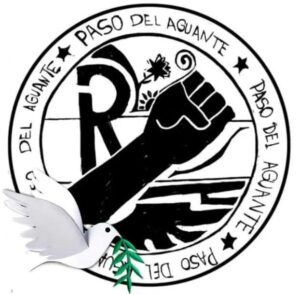The Paso del Aguante Resistance Point emerged during the 2021 National Strike in Comuna 6 of Cali.
On April 28, 2021, thousands of people took to the streets throughout Colombia to oppose a neoliberal tax reform that would make life more expensive for the majority of people. What seemed to be a routine demonstration against an exploitative government policy quickly transformed into a nation-wide uprising after protesters were met with unbridled state violence. Even after the Duque administration retracted the policy that triggered the protest and several ministers resigned, people stayed in the streets.
According to Temblores, 83 people were killed during the 2021 National Strike and at least 44 of them were killed by police and military forces between April 28 and late July 2021. Thousands more were injured. A report by Amnesty International documented at least 28 cases of sexual violence by the police.
Cali — the third-largest city in Colombia and the city with the second-largest black population in Latin America — was the epicenter of the uprising. According to Corporación Justicia y Dignidad, at least 125 people were forcibly disappeared between April 28 and May 6 in Cali alone. Over the course of three months, people transformed their neighborhoods into puntos de resistencia, or “resistance points.” At these resistance points, people built barricades to protect themselves from state violence and to stop the flow of capital. Behind the barricades, the resistance points became vibrant spaces of mutual aid and solidarity. People self-organized community kitchens (ollas comunitarias), provided free medical care, held cultural events, and organized political workshops.
During the uprising, demonstrators also renamed their neighborhoods, and the the area formerly known as the Paso del Comercio became the Paso del Aguante. Paso del Comercio — literally “commerce path” — was named for the commodities that transited through the busy roads connecting Cali to the industrial sites and international airport in the neighboring city of Palmira. Aguante, on the other hand, is synonymous with “resistance” and “endurance.” According to Carolina Montaño Cuero, they renamed it Paso del Aguante because “We endured bullets. We endured teargas. We endured the cold. We endured everything. We’re pure aguante. And that’s where the name Paso del Aguante comes from. That, and also because René sings a song called ‘El Aguante,’ and we would listen to that song. It became like the anthem for our resistance point.”
“No somos los de antes. Somos los de hoy en adelante” (We are not the ones from before. We are the ones from now on.)
This slogan appeared on walls and overpasses around Cali during the uprising. It reveals how the uprising transformed the popular consciousness of people throughout the country. The birth of the resistance points and the collective struggle for dignity revealed an opening and a glimpse of possibility.
This potential for transformation became the state’s biggest fear. In addition to the brutal repression of demonstrators in the streets, the state resorted to accusing participants in the uprising with all kinds of trumped-up charges. Over 370 people were incarcerated for their participation in the uprising.
In a desperate effort to stifle the growing movement, the state falsely accused six young people from the Paso del Aguante Resistance Point with the murder of a police officer on June 3, 2021. Shortly after being accused, the Attorney General’s Office recommended that they be held in pretrial detention in Colombia’s notoriously overcrowded prisons, despite the fact that they maintained their innocence. As a result, four of the six spent more than a year in pretrial detention–two more remain imprisoned.
The Paso del Aguante Six are charged with murder, torture, and forced disappearance for a murder they did not commit and they face sentences that run up to fifty years. In addition to the six people from Paso del Aguante falsely charged with the murder of the police officer, another seven people from the Resistance Point are locked up on other charges.

 (
(